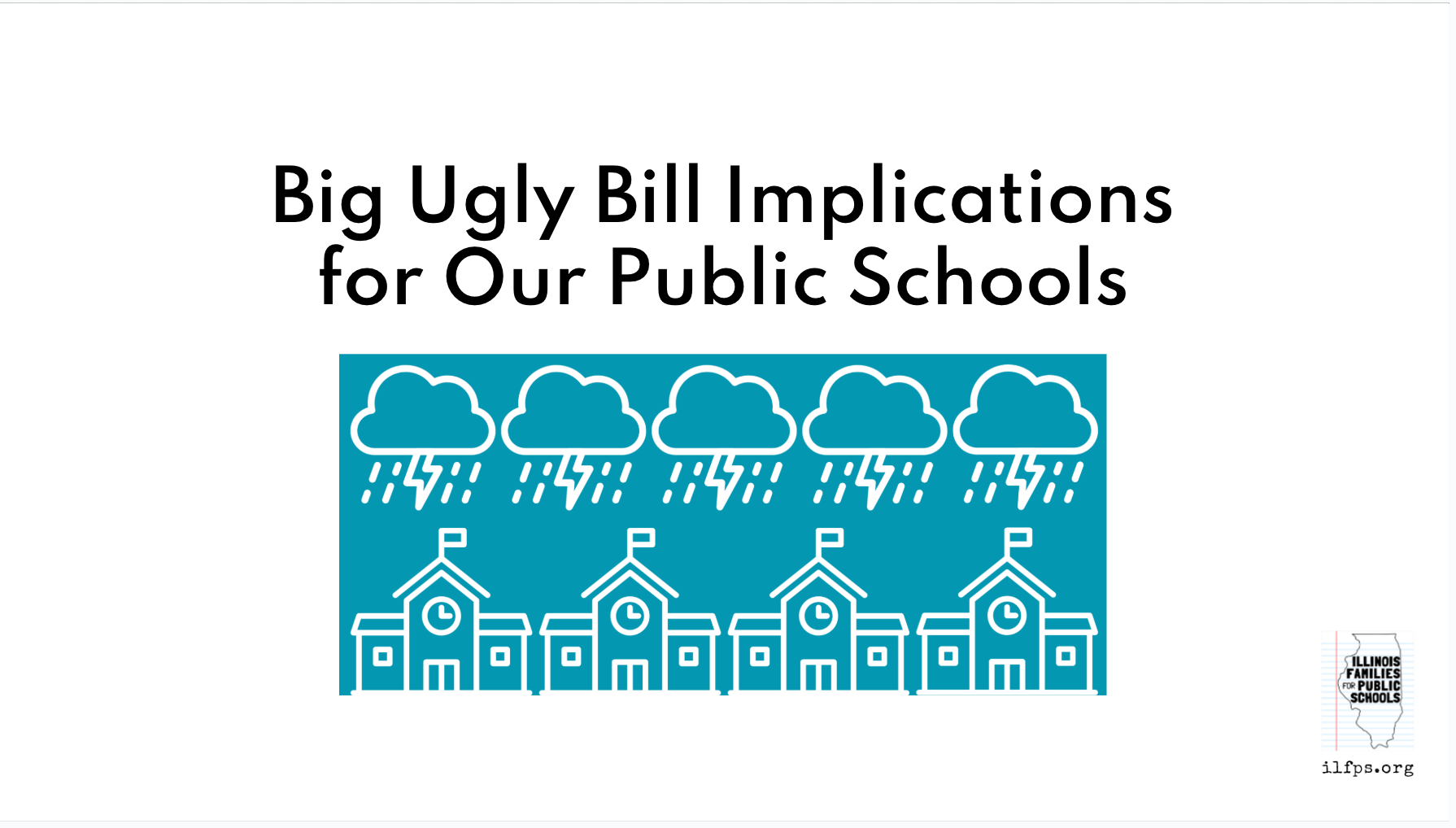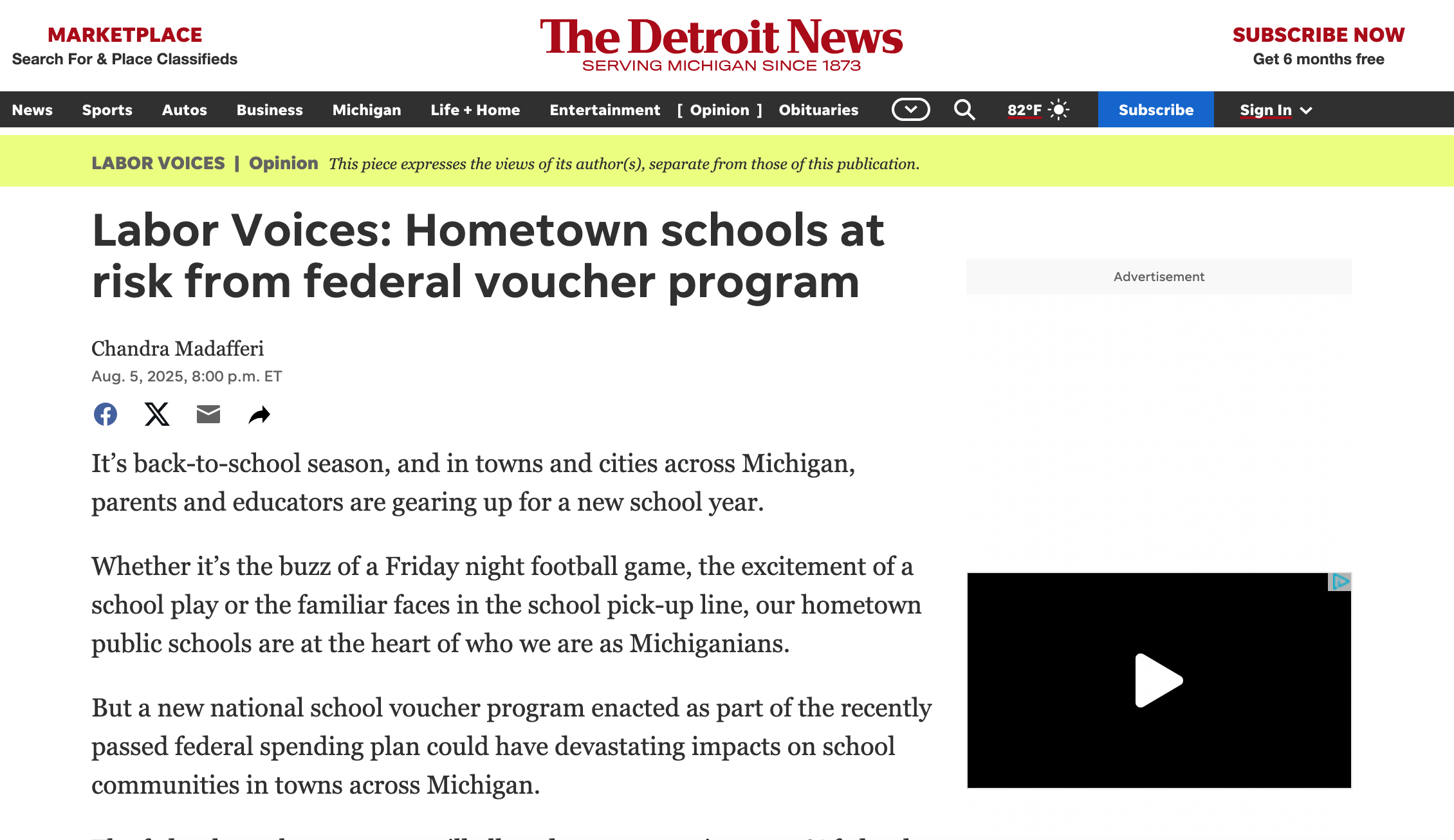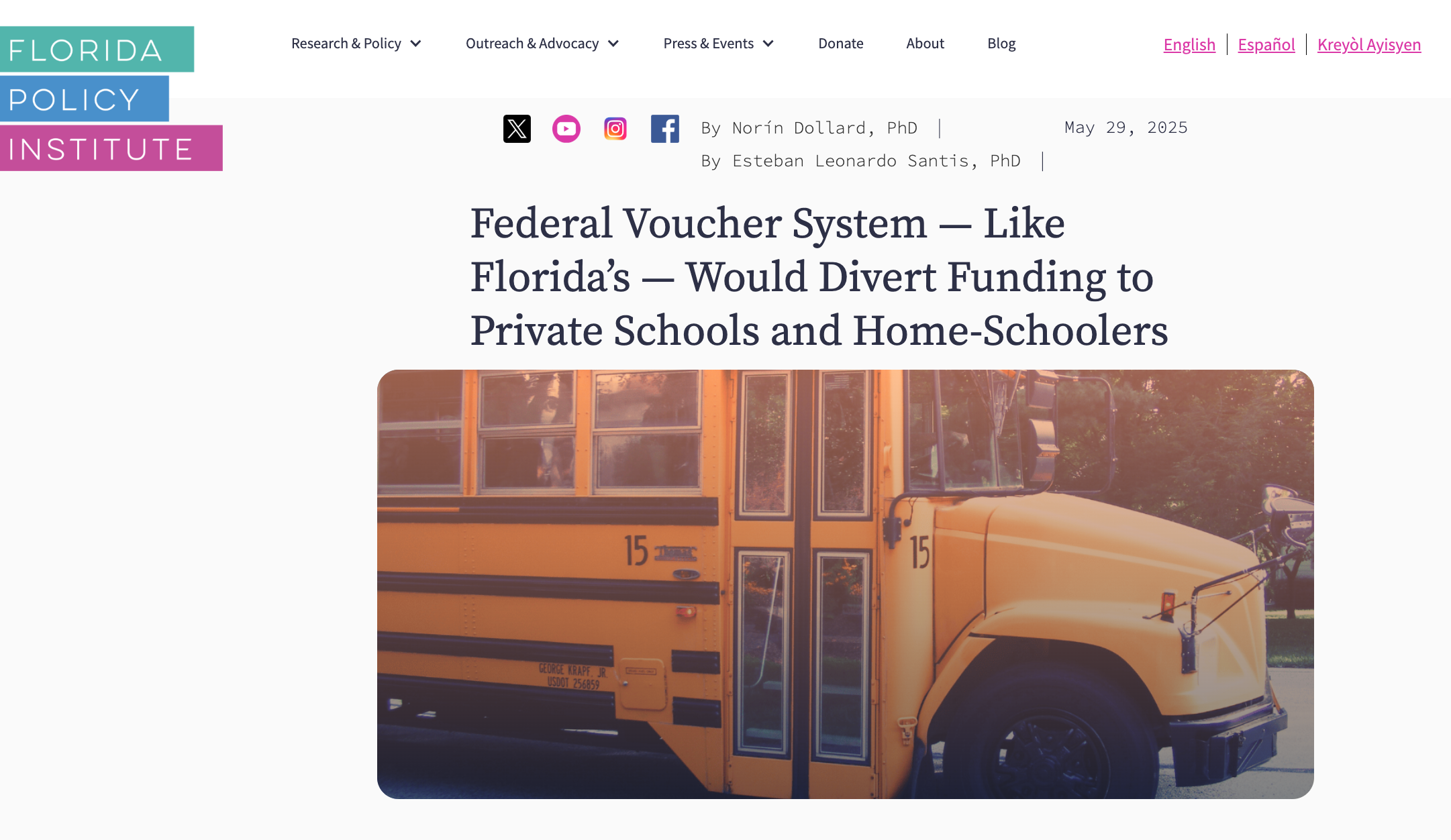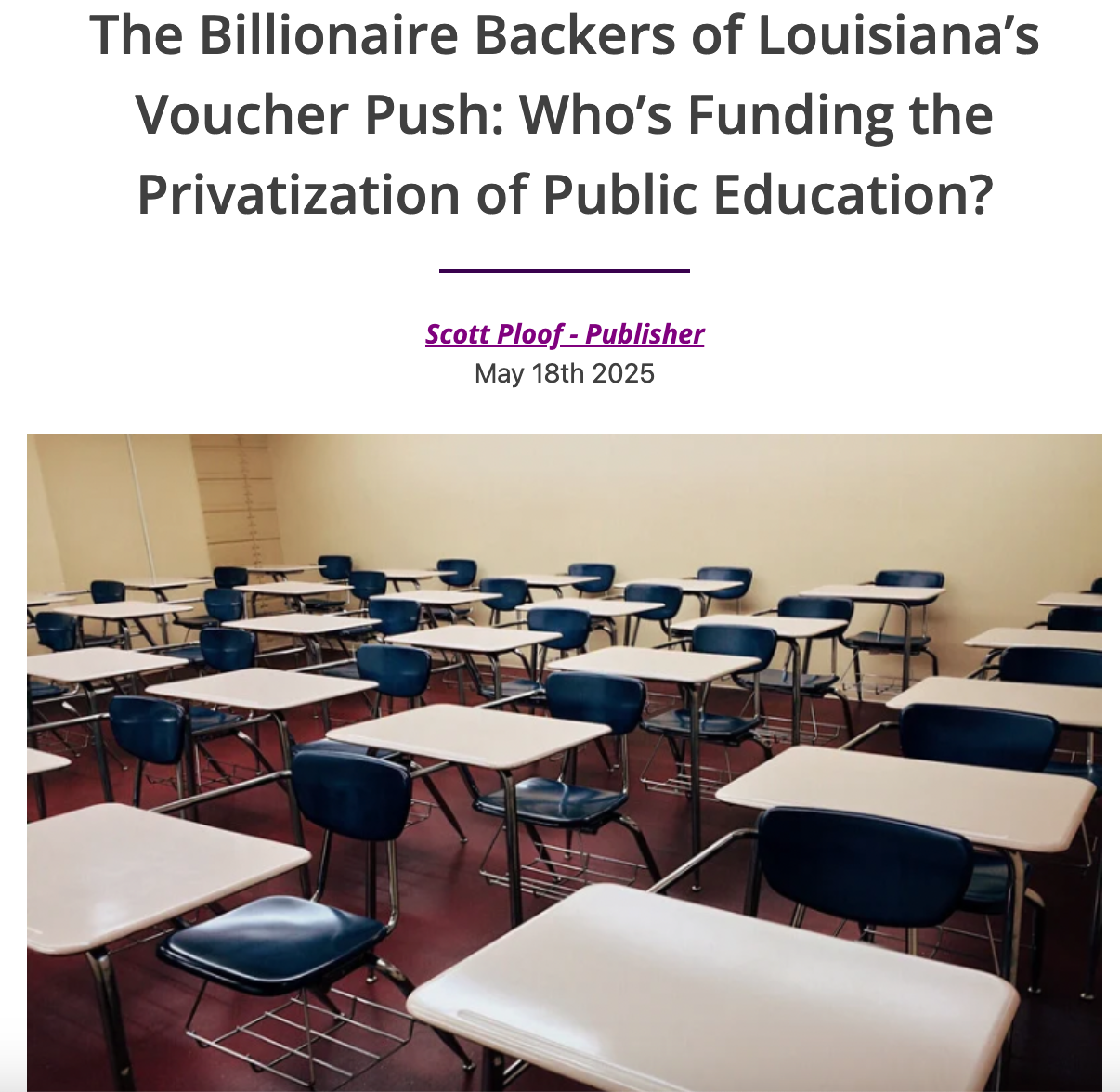ALL RESOURCES
FILTER BY TAG
Select a tag
- Academic performance
- Accessibility
- Accountability
- Advocacy
- Advocates
- Article
- Bill analysis
- Bill tracker
- Billionaires
- Blog post
- Civil rights
- Coalition building
- Community Schools
- Cost impact analysis
- Dark Money
- Data
- Disability
- Discrimination
- Drain funds from public education
- Education Savings Account (ESA)
- English language learners
- Fact sheet
- Fraud Waste and Abuse
- Graphic
- History
- Indigenous and Native Education
- Integration
- LGBTQ+
- Legislation
- Letter
- Litigation
- Messaging or talking points
- Model legislation
- National Voucher
- News
- Parents
- Personal narrative
- Podcast
- Policy brief
- Policymakers
- Radio
- Referendum
- Religion
- Report
- Rural communities
- Segregation
- Separation of church and state
- Slide deck
- Slides
- State Constitutional Right to Education
FILTER BY AUTHOR
Select an author
- Aaron Sanderford
- Alec MacGillis
- Allen Pratt
- Associated Press
- Bob Peterson
- Bruce Schreiner
- Catherine Caruso
- David Montgomery
- David Pepper
- Eli Hager
- Emily Walkenhorst
- Ethan Dewitt
- Geoff Mulvihill
- Hilary Wething
- Howard Fischer
- Jason Bailey
- Jessica Corbett
- Jim Collier
- Joe Dana
- Joshua Cowen
- Juan Perez Jr.
- Kiera Butler
- Laura Pappano
- Liam Amick
- Maurice Cunnningham
- Nora De La Cour
- Paige Masten
- Patrick Darrington
- Paul Hammel
- Phil Williams
- Rob Boston
- Robert Huber
- Rowan Moore Geretsy
- Sasha Pudelski

Federal Voucher Program – FAQs
The expansion of private school vouchers through the inclusion of a federal voucher scheme in the budget reconciliation bill passed in July is part of a broader assault on public education designed to privatize one of the most important common goods underpinning American democracy. Opting in to the federal program (the state’s choice), even to use voucher money for public education students, broadly endangers public education and opens the door to further voucher expansion, whether vouchers are already available in a given state or not.

Big Ugly Bill Implications for Our Public Schools
These slides summarize the impact of the national voucher program and cuts to SNAP/Medicaid in the Trump administration's budget reconciliation bill.

States Must Reject Harmful Voucher Program
The federal voucher program contained in the budget reconciliation bill passed in early July will divert federal tax dollars from the U.S. Treasury and from services, including public education, that Americans rely on, to give to private and religious schools that pick and choose whom they educate and openly discriminate against some students and families.

Directional Signals: A New Analysis of the Evolving Private School Choice Landscape
Three years ago, Arizona became the first state to allow all students—regardless of income or need—to use public dollars for private school tuition and other educational expenses. The move marked a sweeping shift in the scale and scope of school choice in the United States.

Labor Voices: Hometown schools at risk from federal voucher program
Whether it’s the buzz of a Friday night football game, the excitement of a school play or the familiar faces in the school pick-up line, our hometown public schools are at the heart of who we are as Michiganians.
But a new national school voucher program enacted as part of the recently passed federal spending plan could have devastating impacts on school communities in towns across Michigan.

Scamming Our Schools: Robbing Our Students’ Futures to Line Their Pockets
Senator Mazie K. Hirono (D-HI) led a spotlight forum focused on the harmful consequences the Republicans’ “Big Beautiful Bill” will have on students, parents, teachers, and schools across the country. Specifically, the forum highlights the school voucher-related provisions from the bill, which would divert billions of dollars in taxpayer funding to create the first ever national school voucher program.

Federal Voucher System — Like Florida’s — Would Divert Funding to Private Schools and Home-Schoolers
The reconciliation bill passed by the U.S. House of Representatives includes a federal tax credit voucher that would provide taxpayer-funded scholarships to pay for tuition at private schools and for home-schooled students. This $5-billion tax credit would divert funding that would otherwise go into federal coffers. This part of the reconciliation bill would make vouchers available to students in every state, even in those states where voters have opposed them like Kentucky, Colorado, and Nebraska, most recently.

Parents and Allies Oppose National Private School Voucher Program
Policymakers join parents, students, educators and allies to discuss how the national private school voucher program in the budget reconciliation bill would shift resources from public schools to wealthy people and private schools.

Trump and Republicans Want Taxpayers to Fund Their Pet Project: Private Schools
When is a “school choice” proposal not really about school choice? In the budget bill that Republicans rushed through the House on May 12, 2025, school choice is just a cover-up for tax relief for the rich.

The School Voucher Debate – How School Choice Affects Low-Income Communities and Housing
The school choice movement, heavily supported by the Trump administration, aims to expand access to private and charter schools by redirecting public education funds through vouchers. These programs allow families to use taxpayer dollars to pay for private school tuition, but they come with serious consequences for public education, particularly in low-income and minority communities.

Advancement Project National Private School Voucher Program Opposition Letter May 30 2025
On behalf of Advancement Project and 139 national, state, and grassroots racial justice, education justice, and other civil rights organizations, we write urging you to oppose any effort to authorize or create a national private school voucher program.

Trump's Budget Bill Funnels More Money to Billionaires and Wealthy Private Schools
Trump's "big, beautiful bill" hides a massive tax loophole for billionaires that would practically pay them for "donating" money to pay for private school tuition of parents that may earn up to $500,000 per year - both increasing the deficit and weakening public schools. Tell your lawmaker to say NO to school vouchers.

The GOP House Budget Bill Also Takes Aim at Public Education with Its Private School Voucher Scheme
The GOP’s Trump-backed “big, beautiful bill” has passed out of the House of Representatives, and taxpayers are rightfully giving lots of attention to features like the slashing of Medicaid and tax cuts for the wealthy. But buried within the bill is language that would create federal education private school vouchers and provide a tax dodge for the wealthy while eroding the public school system in favor of taxpayer-subsidized discrimination.

The five-alarm fire that public education is facing
All children deserve to attend welcoming and well-funded schools where they can learn and grow, regardless of race, disability, or income. But funding for public schools, where nearly 90% of all U.S. students learn, is at a near crisis point. The Trump administration’s goals, which are taken right out of Project 2025, seem to be to defund public education to the point that it doesn’t work, then offer private school vouchers as a solution to a manufactured problem. In this post, we highlight five ways public education is on fire in the United States and the damage this will do to students’ abilities to learn and thrive. Instead of cutting funds, lawmakers should invest in public schools, one of the best tools we still have to build a prosperous, equitable country.

Public Funds Belong in Public Schools
High-quality public schools are a common good that serve as the bedrock of a high-functioning, multiracial democracy. Yet across Ohio, lawmakers are prioritizing the interests of wealthy donors over the needs of the 10.6 million students who attend public school. Public Funds Belong in Public Schools is a toolkit created for everyday Ohioans who want to stand up for public education and push back against the expansion of private school vouchers.

Advancement Project Letter Opposing HR-833
On behalf of Advancement Project and 93 national, state, and grassroots racial justice, education justice, and other civil rights organizations, we write in opposition to H.R. 833 and S. 292, the Educational Choice for Children Act (“ECCA”), which would create a nationwide private school voucher program in the form of a 100% tax break for the wealthy.

What is the federal private school voucher program?
Social Media Graphics on the impact of the Educational Choice for Children Act.

House Tax Bill Enlists the Wealthy to Spread Private School Vouchers
The tax plan moving through the U.S. House of Representatives includes a provision granting extraordinarily generous treatment to nonprofits that give out vouchers for free or reduced tuition at private K-12 schools. While the bill significantly cuts charitable giving incentives overall, nonprofits that commit to focusing solely on supporting private K-12 schools would be spared from those cuts and see their donors’ tax incentive almost triple relative to what they receive today. On top of that, the bill goes out of its way to provide school voucher donors who contribute corporate stock with an extra layer of tax subsidy that works as a lucrative tax shelter. Essentially, the bill allows wealthy individuals to avoid paying capital gains tax as a reward for funneling public funds into private schools.

The Billionaire Backers of Louisiana’s Voucher Push: Who’s Funding the Privatization of Public Education?
The fight over Louisiana’s public schools isn’t just playing out in classrooms—it’s playing out in boardrooms, campaign finance reports, and legislative backrooms. With the state preparing to launch the Louisiana Giving All True Opportunity to Rise (LA GATOR) Scholarship Program in the 2025–2026 school year, the future of public education in Louisiana is being reshaped by powerful national forces and influential local reformers.

Congress usually snubs private school choice expansion. Trump’s ‘big, beautiful bill’ embraces it.
A big Republican budget bill in Congress would establish a nationwide, federal school choice program — a potential political breakthrough that conservative lawmakers and advocates have discussed for years but which has consistently stalled.
